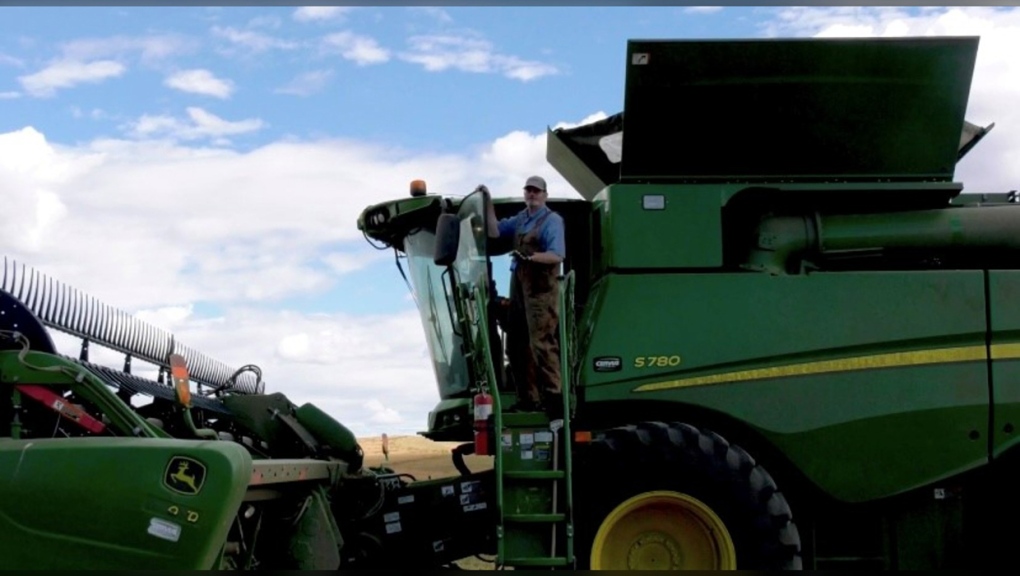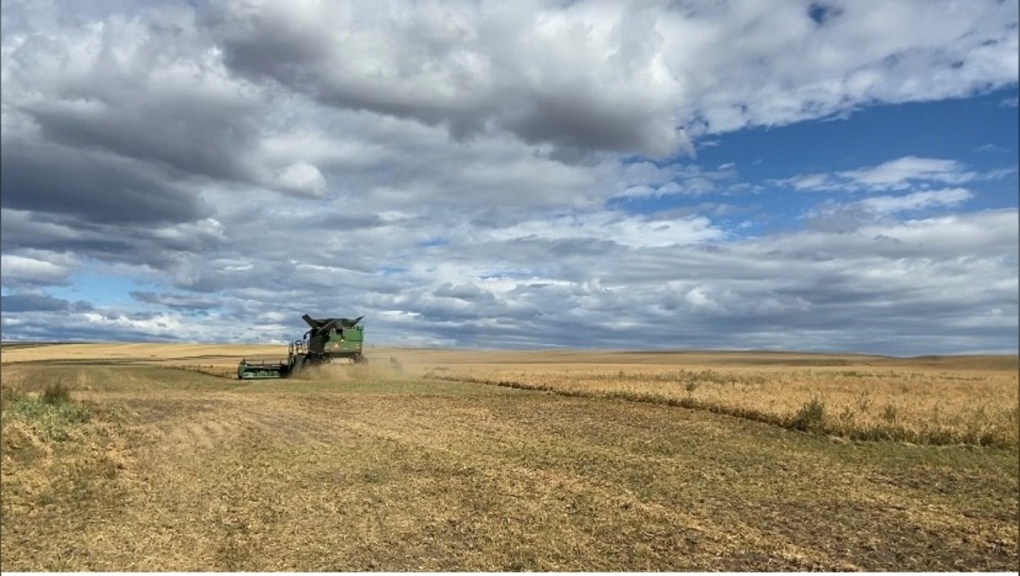Earliest harvest ever in southern Alberta producing about half the yields
After a hot dry stretch this summer, southern Alberta farmers are now reaping the results earlier than ever before and it could affect your grocery bill.
The De Paoli family has been farming their land near Cayley, Alberta — about 70 kilometres south of Calgary — since 1914, but the 2023 harvest is something they’ve never seen before.
“This is the earliest we’ve ever farmed,” said Chance De Paoli a fourth generation farmer.
“Started July 26th, our normal start date is around August 15.”
Dry conditions had many farmers in Southern Alberta harvesting peas as early as July and cereal crops including wheat and barley could be weeks ahead of schedule as well.
“The last few years with the droughts, things have been earlier. We had good moisture to start germinating and it just got stressed and dried out.”
 The De Paoli family has been farming their land near Cayley, Alberta — about 70 kilometres south of Calgary — since 1914, but the 2023 harvest is something they’ve never seen before.
The De Paoli family has been farming their land near Cayley, Alberta — about 70 kilometres south of Calgary — since 1914, but the 2023 harvest is something they’ve never seen before.
A hot stretch made crops mature quickly, meaning far less grain was produced.
“The earlier it comes off, the less of the yield for sure," said De Paoli.
“In the southern part of the province generally a 40-60 per cent yield reduction in some of those areas and some spots are going to be even worse,” said Alberta Grains agronomy research extension manager Jeremy Boychyn.
That means a smaller payout for the producers.
“It creates challenges for them spending money for their inputs and in their community so it does impact the Alberta and Canadian economies,” said Boychyn.
“It’s a lot of uncertainty. So the good years will keep get you through and bad years you can survive on insurance. Hopefully,” said Angelo De Paoli, Chance’s uncle.
Crops grown for cattle have been hit too. Higher feed prices and shortages have prompted many farmers to cull their herds more than usual.
“It could be for a lot of people double what their normal percentage is of cul,” said Chance De Paoli.
“So all these little things add up to a lot more shortages and more tightness in the markets,” said Angelo De Paoli.
And that can impact our food as well.
“The issue with beef is already impacting consumers. Beef prices have gone up about 10 per cent. So far wheat, corn, those prices are quite stable still,” said Sylvain Charlebois.
 Some farmers in southern Alberta are expressing discontent with this year's harvest after a hot and dry growing season.
Some farmers in southern Alberta are expressing discontent with this year's harvest after a hot and dry growing season.
So many farmers have been affected by dry conditions and wildfires that Agriculture and Agri Food Canada and the Alberta government have reopened the AgriStability grant program until September 29.
CTVNews.ca Top Stories

Prime Minister Trudeau meets Donald Trump at Mar-a-Lago
Prime Minister Justin Trudeau landed in West Palm Beach, Fla., on Friday evening to meet with U.S.-president elect Donald Trump at Mar-a-Lago, sources confirm to CTV News.
'Mayday! Mayday! Mayday!': Details emerge in Boeing 737 incident at Montreal airport
New details suggest that there were communication issues between the pilots of a charter flight and the control tower at Montreal's Mirabel airport when a Boeing 737 made an emergency landing on Wednesday.
Hit man offered $100,000 to kill Montreal crime reporter covering his trial
Political leaders and press freedom groups on Friday were left shell-shocked after Montreal news outlet La Presse revealed that a hit man had offered $100,000 to have one of its crime reporters assassinated.
Questrade lays off undisclosed number of employees
Questrade Financial Group Inc. says it has laid off an undisclosed number of employees to better fit its business strategy.
Cucumbers sold in Ontario, other provinces recalled over possible salmonella contamination
A U.S. company is recalling cucumbers sold in Ontario and other Canadian provinces due to possible salmonella contamination.
Billboard apologizes to Taylor Swift for video snafu
Billboard put together a video of some of Swift's achievements and used a clip from Kanye West's music video for the song 'Famous.'
Musk joins Trump and family for Thanksgiving at Mar-a-Lago
Elon Musk had a seat at the family table for Thanksgiving dinner at Mar-a-Lago, joining President-elect Donald Trump, Melania Trump and their 18-year-old son.
John Herdman resigns as head coach of Toronto FC
John Herdman, embroiled in the drone-spying scandal that has dogged Canada Soccer, has resigned as coach of Toronto FC.
Weekend weather: Parts of Canada could see up to 50 centimetres of snow, wind chills of -40
Winter is less than a month away, but parts of Canada are already projected to see winter-like weather.

































